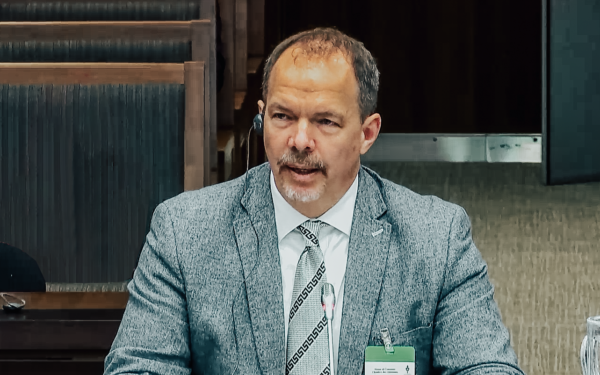Byron Holland shares his views on ICANN accountability and governance showdown
Yesterday I had the privilege of delivering the keynote address at the inaugural Internet Society (Canada) Symposium. In my remarks, I took the opportunity to talk about my thoughts on the current status of the IANA stewardship transition and enhancing ICANN accountability processes.
Fact is I’m getting increasingly concerned. As we head into what will be a critical meeting of the CCWG-Accountability in Los Angeles today, I fear that the Internet governance community is headed for a showdown, the consequences of which could prove detrimental.
We’ve already seen how divided the community is.
In one corner we have the ICANN Working Group on Accountability supported by most of the Internet community saying ‘this is our one and only chance to get the accountability improvements we want and need so we had better not blow it’.
In the other corner we have the Larry Strickling saying, ‘We need an accountability proposal that anticipates and answers ‘any question anyone might have about the plan’. I think that by ‘anyone’ Larry was referring to the U.S. Congress because there is pending legislation, the DOTCOM Act, which require that Larry and his colleagues certify that the accountability proposal that meets U.S. Government established pre-conditions for a transfer of the IANA functions.
If any doubts are raised about this proposal, it will not get through.
Over the past few days we’ve been getting not-so-subtle messages from Larry and Ira Magaziner, the upshot of which is ‘guys, we need to focus on fully elaborating what we need to meet my four criteria which Congress has accepted.’
While many in the community believe that this is our chance to get everything we’ve ever wanted in terms of accountability, it’s becoming increasingly clear that in doing so, we may be putting the death knell in the entire IANA internationalization process.
The ICANN Board of Directors sits fairy firmly in the NTIA corner looking for ways to streamline and simplify the package to get it done quickly. That is to say, to meet the minimum requirements set out by the NTIA in March 2014. But the Internet community sees their ideas as more self-serving than motivated by concerns about the U.S. Government timetable.
Trust is not a word we use often in these circles, but it seems to me that that there isn’t a whole lot of it at play here. So while it is understandable that some may be questioning the Board’s motives, I believe the timing is less than ideal.
Here is the risk.
The degree to which U.S. politics can affect the IANA transition discussion is extraordinary, and not something those of us on the inside of the Internet governance world are giving enough weight to. Two weeks ago, Jeb Bush came out in opposition to IANA transition. It’s notable that a potential Presidential candidate would comment on what is essentially the evolution of oversight on a set of very technical functions. It shows the growing concern about cybersecurity, the context for his comment, and the linkages that he and many like him make between it and Internet governance.
Whether or not this is a valid linkage is beside the point. What Bush is saying is ‘we need to do more to protect ourselves on the Internet; we Americans control it now so we just can’t give it away’.
We won’t be able to get enough detailed work done on the more ambitious working group on accountability package by 2016, an election year in the U.S. And, the community is really left with just two ICANN meetings to deal with it. The ICANN meeting in Dublin is three weeks from now and the third 2016 meeting is just four days before the U.S. election.
And, we have the UN’s WSIS+10 coming up in December.
There are rumours that the UN, spearheaded by Russia, China and others, will vote in favour of more government or inter-governmental involvement in Internet governance. They can – and likely will – hold up the delayed IANA transfer as a failure of the multi-stakeholder model. In essence, by fumbling the ball on this one, the community may very well be handing the bullets to those that would like to see an end to multi-stakeholderism. Furthermore, a push for a multi-lateral approach to governing Internet resources at the WSIS+10 could prompt other presidential candidates to take a specific and negative position on the transfer.
So, the community has a difficult choice to make: scale back the proposal to focus only on meeting the NTIA requirements, or continue on a more fulsome package and risk having the ‘widow of opportunity close’ before they are done. The other stuff is important, but the risk is the detail will not be finished in time. Is it worth losing the whole package over this? I don’t believe it is.
I believe that part of the problem is that some in the community confuse the means with the ends. While the U.S. government ultimately controls the IANA functions, the community treats them just like any other stakeholder. It appears to me that the community thinks that if they can achieve a preponderance of support for a view contrary to where the folks in Washington sit, that somehow this will prevail.
Let’s face facts. With Bush raising the issue, he has materially increased the partisan nature of the IANA transition. It is now the act of a Democratic president, which, given the hyper-partisan nature of U.S. politics, means that Congress will do their best to find all of the proposal’s shortcomings.
Bush has also greatly increased the risk that Congress will say no to the transition. It is, I believe, risky to submit a proposal that doesn’t demonstrably meet the conditions set out by the NTIA. The sooner the our community comes to terms with this, the better off we will be. We are potentially gambling on an issue we don’t want to lose.
If the Congress says no to a package that includes everything the community desires, then it may enflame certain governments into seeking UN action. If this happens, it will only encourage the Congress to ‘raise the bar’ for a transfer or at worst, outright prohibit it and prompt presidential hopefuls to take the same position.
So, my thoughts are this.
We need to come together quickly, to come to a consensus, on how to move the internationalization of the IANA functions forward, taking into account all the key inputs. We need to do this without getting bogged down in work that would push Congress too far, and ultimately block this important transition, finding that we have put ourselves in a position where we have “taken a bridge too far.”
Byron Holland (MBA, ICD.D) is the president and CEO of the Canadian Internet Registration Authority (CIRA), the national not-for-profit best known for managing the .CA domain and developing new cybersecurity, DNS, and registry services.
Byron is an expert in internet governance and a seasoned entrepreneur. Under Byron’s leadership, CIRA has become one of the leading ccTLDs in the world, with over 3 million domains under management. Over the past decade, he has represented CIRA internationally and held numerous leadership positions within ICANN. He currently sits on the Board of Directors for TORIX, and is a member of the nominations committee for ARIN. He lives in Ottawa with his wife, two sons, and their Australian shepherd, Marley.
The views expressed in this blog are Byron’s opinions on internet-related issues, and are not necessarily those of the organization.




